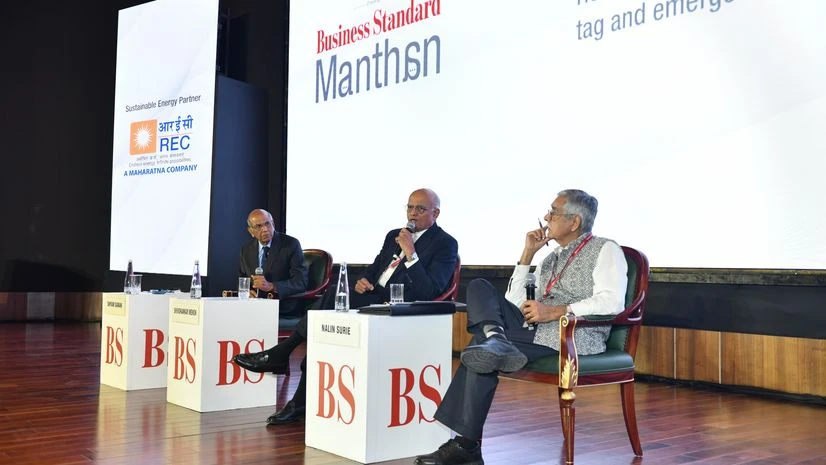India should play to its own intrinsic economic strengths and follow its own path towards development by 2047, which need not replicate China’s trajectory, top former officials and diplomats said on Thursday at Business Standard Manthan.
Discussing how India can shed the West’s ‘China-plus’ tag and emerge stronger, a panel comprising former National Security Advisor Shivshankar Menon, former foreign secretary Shyam Saran, and former Indian High Commissioner to the United Kingdom Nalin Surie argued that India reducing its import dependence on China may be a key step towards this.
“The dragon is a mythical animal. The elephant is a real animal. I don’t think India can be called China-plus. India is Sui Generis. So is China, for that matter. The countries that are part of the ‘plus’ tag are those which are on the same economic track as China essentially is. They have large export-driven economies,” Surie said.
Also Read
Arguing that the economic paths of India and China will be parallel but similar going forward, Surie said there would be areas where they would likely intersect. “China’s attitude is to stare you down, to put you in a corner, in whatever way they can...They would like to suggest India is not a challenge in any way.... I believe for China, the biggest challenge is India, starting with Asia, and going forward,” he said.
On the other hand, Menon said India’s economic future cannot be subjected to somebody else liking China, or not. “Instead, India has to make sure it is equally or more attractive than Thailand, Vietnam, Bangladesh, and Mexico. They are part of large trading arrangements like the US–Mexico–Canada Agreement where they have access to the US market, or the Regional Comprehensive Economic Partnership (RCEP) where they are part of global supply chains, in ways we are not today,” Menon said.
“From the Chinese point of view, over the last few years, they have steadily seen a deterioration in the way the world deals with them. They see the world as less and less of an opportunity. The reason, as Chinese President Xi Jinping himself said in 2012, is the more they rise the more opposition they may expect,” Menon said.
As a result, he said, China has focused on creating a dual circulation economy, which built up domestic economic capacity, while also raising dependence of other nations on the Chinese economy.
Moderating the session, Saran said there had been a number of disruptions in global trade and investment flows where China had become the nodal point for many supply chains.
“The China-plus-one concept had come up briefly as early as 2008 when the severe acute respiratory syndrome epidemic hit China and there were similar supply chain disruptions, albeit on a smaller scale. There were already voices saying there was a need for diversification of the supply chains that were just being established back then. This issue got accelerated by the China-US trade war that is still continuing, and the major disruptions caused by the Covid pandemic,” Saran said.
China remains relevant
Menon pointed out that Western powers have moved from the notion of decoupling their relations with China to instead de-risking just a few strategic sectors. “Everywhere else, China’s trade with the US and European Union is booming. Frankly, the world economy needs China even more today than it did three years ago. China today accounts for almost 40 per cent of the growth in the world economy. When we talk of China-plus-one, they (Western powers) are looking at additionality,” Menon explained.
Saran said the prevalent discourse in India about foreign companies uprooting themselves from the country and moving elsewhere with India being well placed to welcome them was far from the truth. “Nobody is really moving away from China except in a small way. Major multinationals who are already heavily invested in China are putting fresh investments not in China so much, as they are in alternative destinations. We are essentially talking about some incremental investment flows being diverted away from China,” he stressed.
Rising wages in China, and the resultant loss in competitiveness in labour-intensive production has led to this shift, which is being exercised by even Chinese companies, he said.
Reducing imports
Surie pointed out that even after the clashes in Galwan in June 2020, India’s import dependence on China did not go down. “Our imports are close to $98 billion from China. Of this, 28 categories account for $90 billion. Within that, electrical equipment and power equipment account for 50 per cent of imports.”
Meanwhile, Menon said India should follow a ‘China-plus’ strategy in its imports by finding alternative sources for the critical goods imported from China even though it is difficult. “Chinese value addition in Indian exports was 6 per cent in 2006, but shot up to 28 per cent by 2019, just before the Covid pandemic. This is not something we can decouple from. There are no international alternatives,” Menon said.
While it may be difficult to do the same in pharmaceuticals where most of the active pharmaceutical ingredients are sourced from China, Menon held out hope for sectors such as automobiles where greater cooperation with nations in the South East Asian region.

)
